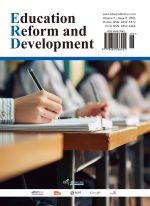Abstract
This paper examines the significance of effective practice in piano learning, particularly the vital role of self-regulation in practice. The quality of practice rather than the quantity is more important for improving musical skills, and self-regulation significantly enhances learning efficiency and performance. The article highlights the crucial role of teachers in fostering students’ self-regulation abilities, including helping them set goals, select effective strategies, conduct self-evaluations, and motivate their learning. By effectively setting goals, choosing strategies (such as slow practice and part-whole practice), conducting self-evaluations, and paying attention to students’ emotions and interests, piano teachers can help students become independent learners and improve practice efficiency. Future research can further explore how students can better engage in self-regulation to enhance the effectiveness of piano practice.
References
Suzuki A, Mitchell H, 2022, What Makes Practice Perfect? How Tertiary Piano Students Self-Regulate Play and Non-Play Strategies for Performance Success. Psychology of Music, 50(2): 611–630.
Cheng Z, Southcott J, 2023, Practice and Learning the Piano: Motivation and Self-Regulation. International Journal of Music Education, 41(3): 345–357.
McPherson G, Osborne M, Evans P, et al., 2019, Applying Self-Regulated Learning Microanalysis to Study Musicians’ Practice. Psychology of Music, 47(1): 18–32.
Oare S, 2012, Decisions Made in the Practice Room: A Qualitative Study of Middle School Students’ Thought Processes While Practicing. Update: Applications of Research in Music Education, 30(2): 63–70.
Mekala S, Radhakrishnan G, 2019, Promoting Self-Regulated Learning Through Metacognitive Strategies. IUP Journal of Soft Skills, 13(2): 21–27.
Savina E, 2021, Self-Regulation in Preschool and Early Elementary Classrooms: Why It Is Important and How to Promote It. Early Childhood Education Journal, 49(3): 493–501.
Townsend B, 2012, Understanding PRACTICE: An Acronym for the Holistic Approach to Practice. International Journal of Music Education, 30(4): 397–408.
Pelikan E, Lüftenegger M, Holzer J, et al., 2021, Learning During COVID-19: The Role of Self-Regulated Learning, Motivation, and Procrastination for Perceived Competence. Zeitschrift für Erziehungswissenschaft, 24(2): 393–418.
Zhang C, Leung B W, 2024, Music Majors’ Self-Regulated Learning (SRL) of Music Practice in China: Two Case Studies Based on the SRL Microanalysis. International Journal of Music Education, 42(3): 367–380.
Pitts S, Davidson J, 2000, Developing Effective Practice Strategies: Case Studies of Three Young Instrumentalists. Music Education Research, 2(1): 45–56.
Oare S, 2012, Decisions Made in the Practice Room: A Qualitative Study of Middle School Students’ Thought Processes While Practicing. Update: Applications of Research in Music Education, 30(2): 63–70.
Pike P, 2017, Self-Regulation of Teenaged Pianists During At-Home Practice. Psychology of Music, 45(5): 739–751.
Allingham E, Wöllner C, 2023, Putting Practice Under the Microscope: The Perceived Uses and Limitations of Slow Instrumental Music Practice. Psychology of Music, 51(3): 906–923.
Crappell C, 2019, Teaching Piano Pedagogy: A Guidebook for Training Effective Teachers. Oxford University Press.
Macmillan J, 2010, Successful Practising: A Handbook for Students, Parents and Music Teachers. Jenny Macmillan.
Yin H, Li W, 2021, Feynman Learning Method. Jiangsu Phoenix Literature and Art Publishing House, Nanjing.
